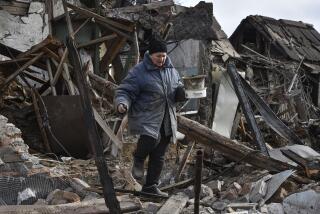NATO Retaliates, Bombs Serb Tank in Bosnia : Balkans: Air strikes are launched after a French soldier is seriously wounded in a rebel attack.
- Share via
VIENNA — NATO warplanes on Thursday punished a Bosnian Serb attack on U.N. troops by bombing an unmanned tank near Sarajevo, increasing tension in the troubled peacekeeping mission and reminding a world distracted by other crises that war still rages in the Balkans.
The air strikes, carried out at dusk by American and British aircraft, were provoked by a Serbian attack on French troops earlier in the day, NATO officials said. In that incident, four rocket-propelled grenades were fired at a light-tank unit northeast of the Bosnian capital. One French soldier was seriously wounded.
The NATO action was called for by French Gen. Bertrand de Lapresle, the U.N. Protection Force commander, “to prove that he would not take the attack on the French tank lying down,” said squadron leader Maj. Nigel Branston, a spokesman at the North Atlantic Treaty Organization’s headquarters for southern Europe in Naples, Italy.
But the air strike threatened to widen a rift between NATO countries with peacekeeping forces deployed in Bosnia-Herzegovina and others--chiefly the United States--that have been pressing for tougher measures against the defiant Serbs without the same fear of consequences for troops on the ground.
French and British soldiers serving with the U.N. mission in Bosnia have become the chief targets of angry Serbs as pressure builds in Western countries for an end to a U.N. arms embargo that has severely disadvantaged the Muslim-led Bosnian government.
,British Lt. Gen. Michael Rose, commander of U.N. troops in Bosnia, opposes any moves the rebels would see as outside forces taking sides against them, such as air strikes or seeking to arm the government forces. Rose has repeatedly declined to use force to compel the Serbs to honor weapons-exclusion zones proclaimed around Sarajevo and the eastern town of Gorazde.
Serbian forces also routinely violate a “no-fly” zone declared over Bosnia. Paul Risley, a spokesman at U.N. headquarters in Zagreb, Croatia, said U.N. observers have reported “scores of sorties” by Bosnian Serb helicopters to battlefronts in the republic’s northeast.
Thursday’s air strike was carried out by NATO aircraft flying over Bosnia in what are usually symbolic patrols.
De Lapresle called on NATO to retaliate for the attack on the French unit, prompting alliance commanders in Naples to order pilots near Sarajevo to find and destroy a previously identified target, a T-55 tank deployed about two miles from the U.N.-controlled airport in violation of the weapons-exclusion zone.
A U.S. A-10 Warthog, the air combat workhorse dubbed the “tank-buster,” located the tank and ran a strafing sortie at 6:25 p.m. The pilot reported back that he was unsure he had hit the target shrouded in shadows, Branston said. Two British Jaguars then swept the area near the Serbian base at Lukavica, each dropping a 1,000-pound bomb.
“We have no final report on damages,” Branston said. “The (U.S.) cannon fire was thought to have missed, but the 1,000-pound bombs hit on or very near to the target.”
He said no casualties were believed to have been incurred on the Serbian side because the tank was chosen by De Lapresle “on the basis that there would be no loss of life, because there had been no loss of life on the U.N. side.”
U.N. commanders have become fearful of the precarious position in which the foreign troops deployed in Bosnia find themselves as pressure builds to end the lopsided arms embargo.
The Clinton Administration has warned that it will press the U.N. Security Council to exempt the Bosnian government unless the Serbian rebels agree to an internationally mediated peace plan by Oct. 15. Washington has also suggested that it may act unilaterally to arm the outgunned government forces if Security Council allies refuse to go along.
There were indications that the latest air strike, at least in part, reflects the tougher stance in favor of NATO action in Bosnia reportedly being pressed by the United States.
According to NATO sources, the Administration wants to be able to point to a more aggressive alliance response to Serbian violations as a way to persuade Congress to give up its plan to vote for a unilateral lifting of the arms embargo.
Western diplomats in this Austrian capital say they detect serious resistance in the Pentagon and in some parts of the White House to any action that could sour relations with NATO allies.
Many fear that ending the embargo will intensify Bosnia’s blood bath and force U.N. troops to pull out of the region to avoid being attacked or taken hostage by resentful Serbs.
Air power has been used only four times previously against the Serbs: once in February, when four aircraft violating the “no-fly” zone were shot down; twice in April to slow a rebel assault against Muslim civilians in Gorazde after hundreds had been killed in the purportedly U.N.-protected “safe area,” and on Aug. 5, when U.S. warplanes shot up an antiquated mobile gun near Sarajevo after rebels had seized tanks and armored vehicles from a U.N.-guarded weapons containment site.
Times staff writers Tyler Marshall in Brussels and Stanley Meisler at the United Nations contributed to this report.
More to Read
Sign up for Essential California
The most important California stories and recommendations in your inbox every morning.
You may occasionally receive promotional content from the Los Angeles Times.














